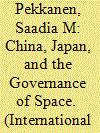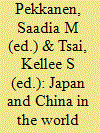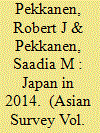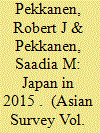|
|
|
Sort Order |
|
|
|
Items / Page
|
|
|
|
|
|
|
| Srl | Item |
| 1 |
ID:
061222


|
|
|
|
|
| Publication |
Jan-Apr 2005.
|
| Summary/Abstract |
The Japanese government today is actively and strategically choosing among various institutional forums to deal with its trade partners, namely bilateral venues, multilateral settings, and even preferential regional arrangements. This ongoing high-profile institutional selection is somewhat unprecedented for Japan, and demands a review of the historical and analytical reasons that drive decisionmakers to select one forum over another. Overall, the Japanese case suggests that the aggregate trade forum choices are influenced both by the desire to institutionalize mechanisms for stabilizing a range of expectations and by the necessity of guaranteeing market access and protection of investment in the fastest time possible.
|
|
|
|
|
|
|
|
|
|
|
|
|
|
|
|
| 2 |
ID:
189484


|
|
|
|
|
| Summary/Abstract |
China and Japan are among the world’s top space powers, with significant technical competence in both conventional and ‘newspace’ capabilities. Since the early 1990s, each country has also taken a keen interest in shaping the governance of outer space activities. But they have done so in remarkably different ways, calling into question Asian states’ supposed preferences for soft and informal institutions. Japan has led the Asia-Pacific Regional Space Agency Forum, involving both state and nonstate participants, which is guided by a set of principles. China has opted for a high-profile formal intergovernmental design, the Asia-Pacific Space Cooperation Organization, with a Convention and all the trappings of a formal organizational structure. This article assesses the activities of China and Japan in the new space race, discusses how and why the design of their space governance differs, and reflects on prospects for competition and cooperation.
|
|
|
|
|
|
|
|
|
|
|
|
|
|
|
|
| 3 |
ID:
067537


|
|
|
|
|
| Publication |
London, Routledge, 2005.
|
| Description |
xxi, 245p.
|
| Series |
Politics in Asia series
|
| Standard Number |
0415369010
|
|
|
|
|
|
|
|
|
|
|
|
Copies: C:1/I:0,R:0,Q:0
Circulation
| Accession# | Call# | Current Location | Status | Policy | Location |
| 050559 | 330.952/VOG 050559 | Main | On Shelf | General | |
|
|
|
|
| 4 |
ID:
137905


|
|
|
|
|
| Summary/Abstract |
It was all about Abe in 2014. With few intra-party challengers, a divided and weak opposition, and a huge victory in a December snap election gamble, Japan’s Prime Minister Abe finds unusual scope to lead the nation both domestically as well as internationally in his chosen course of ‘‘proactive pacifism.’’
|
|
|
|
|
|
|
|
|
|
|
|
|
|
|
|
| 5 |
ID:
145432


|
|
|
|
|
| Summary/Abstract |
The year 2015 revolved around Prime Minister Abe Shinzō, who led his Liberal Democratic Party (LDP) to a resounding electoral victory in December 2014, thus opening the door for the LDP and its coalition partner Komeito to pass a major revision of Japan’s security policy, despite public outcry and over a fragmented field of opposition parties.
|
|
|
|
|
|
|
|
|
|
|
|
|
|
|
|
| 6 |
ID:
049876


|
|
|
| 7 |
ID:
187768


|
|
|
|
|
| Summary/Abstract |
Data from small satellites are rapidly converging with high-speed, high-volume computational analytics. “Small satellites, big data” (SSBD) changes the ability of decision-makers to persistently see and address an array of international security challenges. An analysis of these technologies shows how they can support decisions to protect or advance national and commercial interests by detecting, attributing, and classifying harmful, hostile, or unlawful maritime activities. How might the military, law enforcement, and intelligence communities respond to maritime threats if these new technologies eliminate anonymity at sea? The emerging evidence presented on maritime activities is intertwined with national security (e.g., territorial and resource claims, sanctions violations, and terrorist attacks), legal and illicit businesses (e.g., illegal fishing, trafficking, and piracy), and other concerns (e.g., shipping and transit, chokepoints, and environmental damage). The ability of SSBD technologies to observe and catch wrongdoing is important for governments as well as the commercial, academic, and nongovernmental sectors that have vested interests in maritime security, sustainable oceans, and the rule of law at sea. But findings indicate that transparency alone is unlikely to deter misconduct or change the behavior of powerful states.
|
|
|
|
|
|
|
|
|
|
|
|
|
|
|
|
| 8 |
ID:
079954


|
|
|
|
|
| Publication |
2007.
|
| Summary/Abstract |
The explosive proliferation of trade forums poses fundamental questions about why states forum-shop as they pursue liberalization. We advance a novel argument linking the institutional design of international trade forums directly to domestic politics. If industrialized democratic states have to appease conflicting forces in the domestic political marketplace as economic liberalization proceeds apace, they should prioritize forums that allow them to exert greater control over the pace and scope of liberalization. This prioritization is influenced by a tradeoff between two critical dimensions that combine differently across all international trade forums: the gains dimension, which determines the extent to which states can increase economic welfare based on the forum's rules; and the control dimension, which determines the extent to which they have power to set the forum's rules in line with their political concerns. We use the case of Japan to demonstrate the importance of the gains-control tradeoff.
|
|
|
|
|
|
|
|
|
|
|
|
|
|
|
|
|
|
|
|
|